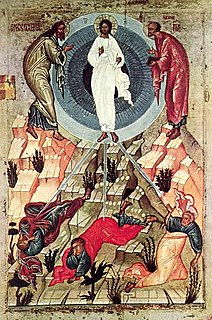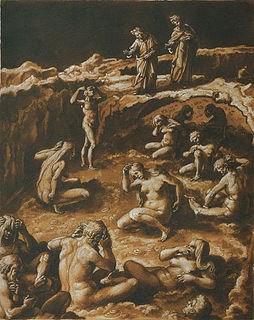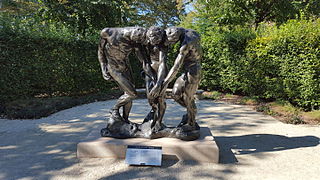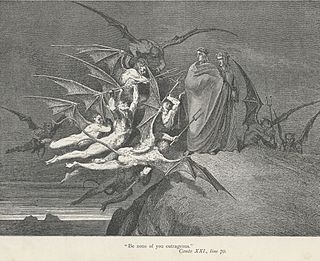
Odysseus, also known by the Latin variant Ulysses, is a legendary Greek king of Ithaca and the hero of Homer's epic poem the Odyssey. Odysseus also plays a key role in Homer's Iliad and other works in that same epic cycle.

Nicolas Malebranche was a French Oratorian Catholic priest and rationalist philosopher. In his works, he sought to synthesize the thought of St. Augustine and Descartes, in order to demonstrate the active role of God in every aspect of the world. Malebranche is best known for his doctrines of vision in God, occasionalism and ontologism.

Purgatorio is the second part of Dante's Divine Comedy, following the Inferno and preceding the Paradiso. The poem was written in the early 14th century. It is an allegory telling of the climb of Dante up the Mount of Purgatory, guided by the Roman poet Virgil—except for the last four cantos, at which point Beatrice takes over as Dante's guide. Allegorically, Purgatorio represents the penitent Christian life. In describing the climb Dante discusses the nature of sin, examples of vice and virtue, as well as moral issues in politics and in the Church. The poem posits the theory that all sins arise from love – either perverted love directed towards others' harm, or deficient love, or the disordered or excessive love of good things.
Barbariccia is one of the demons in the Inferno of Dante Alighieri's Divine Comedy. Barbariccia is one of the Malebranche, whose mission is to guard Bolgia Five in the Eighth Circle, the Malebolge. Barbariccia's name means "curly beard" in Italian. Barbariccia seems to be the most important devil after Malacoda as he becomes the "provost" of nine other devils, when Malacoda commands them to escort Dante and Virgil, which can be read out of the following text :

In Dante Alighieri's Inferno, part of the Divine Comedy, Malebolge is the eighth circle of Hell. Roughly translated from Italian, Malebolge means "evil ditches". Malebolge is a large, funnel-shaped cavern, itself divided into ten concentric circular trenches or ditches. Each trench is called a bolgia. Long causeway bridges run from the outer circumference of Malebolge to its center, pictured as spokes on a wheel. At the center of Malebolge is the ninth and final circle of hell.
The Cantos by Ezra Pound is a long, incomplete poem in 116 sections, each of which is a canto. Most of it was written between 1915 and 1962, although much of the early work was abandoned and the early cantos, as finally published, date from 1922 onwards. It is a book-length work, widely considered to be an intense and challenging read. The Cantos is generally considered one of the most significant works of modernist poetry in the 20th century. As in Pound's prose writing, the themes of economics, governance and culture are integral to the work's content.

Brenda Barrett is a fictional character from the ABC Daytime soap opera, General Hospital. The role was originated by Vanessa Marcil on September 18, 1992. After a six-year run with the show, the character was believed to have died after her mentally ill mother drove their car off a cliff. After a four-year absence, Marcil reprised her role for a few short months. Marcil was nominated for a Daytime Emmy Award in the category of Outstanding Supporting Actress in a Drama Series for her role as Brenda in 1997 and 1998, and she won in that category in 2003.

Ciampolo is the accepted name of a character in Dante's Divine Comedy.

Iacopo Rusticucci was a Guelph politician and accomplished orator who lived and worked in Florence, Italy in the 13th century. Rusticucci is realized historically primarily in relation to the Adimari family, who wielded much power and prestige in thirteenth-century Florence, and to whom it is thought Rusticucci was a close companion, representative, and perhaps lawyer. Despite his association with men born into high political and social rank, Rusticucci was not born into nobility, and nothing is known of his ancestors or predecessors. The exact dates of his birth and death are unknown.

The Divine Comedy has been a source of inspiration for artists, musicians, and authors since its appearance in the late 13th and early 14th centuries. Works are included here if they have been described by scholars as relating substantially in their structure or content to the Divine Comedy.

Prayers to Broken Stones is a short story collection by American author Dan Simmons. It includes 13 of his earlier works, along with an introduction by Harlan Ellison in which the latter relates how he "discovered" Dan Simmons at the Colorado Mountain College's "Writers' Conference in the Rockies" in 1981. The title is a borrowed line from T. S. Eliot's "The Hollow Men".

Malacoda is a character in Dante Alighieri's Inferno, where he features as the leader of the Malebranche, the twelve demons who guard Bolgia Five of Malebolge, the eighth circle of Hell. The name Malacoda is roughly equivalent to "bad tail" or "evil tail" in Italian. Unlike other characters such as Geryon, which are based on mythical characters, Malacoda was invented by Dante and is not a mythological reference.
Gualdrada Berti dei Ravignani was a member of the nobility in twelfth-century Florence, Italy. She was a daughter of Bellincione Berti. A descendant of the Ravignani family, Gualdrada later married into the powerful Conti Guido family. Her character as a pure and virtuous Florentine woman is called upon in many late medieval Italian works.

Inferno is the first part of Italian writer Dante Alighieri's 14th-century epic poem Divine Comedy. It is followed by Purgatorio and Paradiso. The Inferno describes Dante's journey through Hell, guided by the ancient Roman poet Virgil. In the poem, Hell is depicted as nine concentric circles of torment located within the Earth; it is the "realm ... of those who have rejected spiritual values by yielding to bestial appetites or violence, or by perverting their human intellect to fraud or malice against their fellowmen".

Paradiso is the third and final part of Dante's Divine Comedy, following the Inferno and the Purgatorio. It is an allegory telling of Dante's journey through Heaven, guided by Beatrice, who symbolises theology. In the poem, Paradise is depicted as a series of concentric spheres surrounding the Earth, consisting of the Moon, Mercury, Venus, the Sun, Mars, Jupiter, Saturn, the Fixed Stars, the Primum Mobile and finally, the Empyrean. It was written in the early 14th century. Allegorically, the poem represents the soul's ascent to God.
Calcabrina is one of the demons featured in Inferno, the first canticle of Dante Alighieri's Divine Comedy. Calcabrina's name is possibly meant to mean "grace-stomper" or "frost trampler."

The Malebranche are the demons in the Inferno of Dante's Divine Comedy who guard Bolgia Five of the Eighth Circle (Malebolge). They figure in Cantos XXI, XXII, and XXIII. Vulgar and quarrelsome, their duty is to force the corrupt politicians (barrators) to stay under the surface of a boiling lake of pitch.

Alichino is one of the devils in the Inferno of Dante Alighieri's Divine Comedy. Alichino is a member of the Malebranche, whose mission is to guard Bolgia Five in the Eighth Circle, the Malebolge. Alichino's name is commonly regarded as a garbled version of the Italian word for harlequin, Arlecchino, perhaps for his flying attempt to catch Bonturo Dati in his escape. His only significant contribution to the plot is when he persuades the other devils to leave Bonturo Dati alone. Bonturo is supposed to summon other sinners from the lake of boiling pitch, on request by Dante. But Bonturo doesn't call at his friends. Instead, he fools the devils and escapes back to the lake, and Alichino tries in vain to catch him. This causes a fight between Alichino and Calcabrina, which causes them to fall into the lake. The other devils put the blame on Virgil and Dante, though and hunt them vexed.
Ciriatto is one of the Malebranche in Dante's Inferno, appearing in Cantos XXI, XXII and XXIII.













